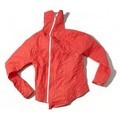Biomimetic, Low-Power, Controllable Shading for Buildings
by: Eco Geek Latest, 2011-02-23 16:30:22 UTC

Glass buildings can provide an appealing environment of light and openness, but too much sunlight will over heat the building, as well as creating glare. While conventional shades can be used to control light levels, a new option is to use a low power material attached to the glass that can quickly adjust to increase shading or let more light in as needed.
As shown by their presentation, the shading system developed by designers Decker Yeadon can be installed in an organic configuration to highlight the biomimetic nature of this material. These shades use a dielectric elastomer, which is stressed and changes configuration when a charge is applied. When actuated with a low-power electric charge, tension in the dielectric increases, which causes it to contract. As it does so, it pulls on the flexible polymer core inside it, causing the assembly to spread open and increase the shading.
The video clip demonstrates how it works with a sample section of the material that looks something like a butterfly opening and closing its wings. The dielectric surfaces of the material are coated with silver which acts as a conductor for the low power current needed to activate the material, as well as being an excellent reflector of sunlight to provide rejection of excessive daylight when acting as a shade.
The presentation implies that the actuation of the shading material is automatic, though it is unclear whether this is an inherent property of the material itself (which seems to be implied, but is not directly stated) or whether there is an external system controller that applies a charge when the system is to be activated. In either case, the fact that the system requires low power makes it an intriguing option. And since "the shade is the motor," very localized control is possible with the material.
This system is intended for use inside a double-wall glazing system, presumably because it is far too delicate to be exposed to weather if it was exposed on the outside of a building. Because of this, it is unlikely to be a widely adopted solution, but it does represent a first step with an intriguing material that has many potential uses beyond just green buildings.
via: Treehugger
 Industrial Design Piracy Continues to Thrive, Plagiarus Continues to Fight It
Industrial Design Piracy Continues to Thrive, Plagiarus Continues to Fight It
by: Core77, 2011-02-25 15:30:00 UTC

Design piracy is not new, and since 1977 an organization called Action Plagiarus has been handing out annual "awards" to the most egregious copycats. For the 2011 Plagiarus Awards, top prize went to the Multifunctional Workbench rip-off seen above, which was originally designed by one German firm and nearly dead-copied by another. As for which photo is the real thing and which is the copy, they don't even say.


What's becoming a little scary is how closely the copies are able to mimic the originals. But as Hansgrohe-Axor points out in an e-mail blast following the blatant copying of their Focus S faucet by a Chinese manufacturer,

"...Our original product offers considerably more in terms of functionality, and it therefore represents greater value for the user," [says Richard Grohe.] In the case of the Focus S, this additional functionality consists of a flow limiter, for example, which reduces water consumption to five liters per minute, the QuickClean anti-lime scale function, and an integrated hot-water flow safety restriction.
"The makers of pirated copies generally hope to be competitive on the basis of low cost," says the Deputy Chairman of Hansgrohe. "They therefore invest little in the functionality and quality of the products. Usually it is the consumer who is disadvantaged. Consumers will always be better off choosing the original product."
If you guys think ID piracy is bad now, just wait until 3D scanners and RP become truly ubiquitous. And eventually, some manufacturer will get really meta and make knock-offs of those too.
(more...)


Spain Lowers Speed Limits to Reduce Oil Usage
by: Inhabitat , 2011-02-25 18:46:02 UTC

Unrest in the middle east has caused gas prices to rise across the world. As a precautionary energy-saving initiative, Spain has announced that it will lower its highway speed limits, cut train ticket prices and use more biofuels to reduce oil consumption. Thirteen percent of the oil Spain consumes comes from Libya, so a $1.37 per barrel increase in oil prices will cost Spain an extra $690 million per month.





Read the rest of Spain Lowers Speed Limits to Reduce Oil Usagehttp://www.inhabitat.com/wp-admin/ohttp://www.inhabitat.com/wp-admin/options-general.php?page=better_feedptions-general.php?page=better_feed
Permalink |
Add to
del.icio.us |
digg
Post tags: fuel consumption, global oil consumption, libya, libya global oil prices, libya oil, lower fuel consumption, lower speed limits, middle east unrest, oil prices, Spain, spain oil consumption
China Blocks Access to LinkedIn
by: fast company, 2011-02-24 22:18:54 UTC
China's "Great Firewall" has claimed its newest casualty--wildly popular career networking site LinkedIn.

Users in China are reporting that access to LinkedIn has been blocked throughout the country. By all indications, it seems that the popular career networking site has run afoul of the country's infamous Great Firewall.
According to LinkedIn's Hani Durzy, the company is aware of a blockage in China and is "currently in the process of investigating the situation further."
The shutdown follows days of calls for a "Jasmine Revolution" in China, on the model of the Tunisian and Egyptian revolutions. Access to Twitter and Facebook has been blocked throughout China for some time; Chinese internet users seeking to use Twitter have been forced to access the site through difficult-to-use Virtual Private Networks (VPNs).
However, Chinese dissidents have another way of accessing Twitter...LinkedIn.
Use of LinkedIn, which is fully integrated with Twitter, was by far the easiest way to access Twitter in China. Messages can be easily read and posted through Twitter via LinkedIn.
One Chinese Twitter user who accesses both Twitter and LinkedIn through a proxy posted photos to Twitpic that seem to confirm a Chinese LinkedIn outage.
Adding credence to the LinkedIn-shutdown-to-block-Twitter strategy is the news that the Chinese government has started censoring the name of U.S. Ambassador Jon Huntsman from search results on the wildly popular homegrown Twitter/Tumblr clones Sina Weibo/QQ Weibo. Weibo means “microblog” in Chinese.
Huntsman faces widespread charges in China of support for the Jasmine Revolution after a citizen journalist spotted him watching a pro-democracy protest from within a crowd this past Sunday. Like any good American abroad, Huntsman was standing outside a McDonald's.
According to The Wall Street Journal, Chinese dissidents have been disseminating calls to protest and organizing events via LinkedIn.
Reuters notes that the LinkedIn outage could hurt the firm's chances at an IPO:
If the disruption for LinkedIn is permanent in China, it could hurt the company's prospects at an IPO as a ban would exclude the company from the world's largest Internet market--about 450 million users and growing.
"It certainly would be a negative in terms of the company's future growth and profitability," said Jay Ritter, a professor of finance at the University of Florida.
"This is something where investors would take it into account and be willing to pay a little lower price per share."
Luckily for LinkedIn, China's Internet censors are notoriously fickle: Sites blip on and off the Great Firewall frequently, with no prior warning.
Related: Fast Company's Anya Kamenetz recently interviewed LinkedIn CEO Reid Hoffman. Read more about the social networking site as part of our Most Innovative Companies of 2011 project.
For more stories like this, follow @fastcompany on Twitter. Email Neal Ungerleider, the author of this article, here.


 New Lithium-Ion Batteries Could Significantly Extend the Range of Electric Cars
New Lithium-Ion Batteries Could Significantly Extend the Range of Electric Cars
by: Inhabitat , 2011-02-24 19:28:38 UTC

Range anxiety is one of the biggest hurdles facing electric cars today. For electric vehicles to truly become mainstream, batteries will have to provide a longer range and become much cheaper. Now, researchers from South Korea have developed an advanced lithium-ion battery, that has a high energy content and rate capacity — making electric cars even more competitive than their gas-powered counterparts.


Read the rest of
New Lithium-Ion Batteries Could Significantly Extend the Range of Electric Carshttp://www.inhabitat.com/wp-admin/ohttp://www.inhabitat.com/wp-admin/options-general.php?page=better_feedptions-general.php?page=better_feed
Permalink |
Add to
del.icio.us |
digg
Post tags: batteries, electric batteries, electric car, electric car batteries, electric vehicles, lithium batteries, lithium ion battery, lithium-ion electric car batteries, plug-in vehicles, range anxiety
The Best Sustainable Ceramics From Cevisama 2011
by: Inhabitat , 2011-02-24 23:56:29 UTC














Read the rest of The Best Sustainable Ceramics From Cevisama 2011http://www.inhabitat.com/wp-admin/ohttp://www.inhabitat.com/wp-admin/options-general.php?page=better_feedptions-general.php?page=better_feed
Permalink |
Add to
del.icio.us |
digg
Post tags: ALICER ITC, apavisa, ceracasa, ceramic tiles, cevisama, Cevisama 201, cevisama 2011, green building materials, green ceramics, green design, inalco, lama, lifearq, natucer, recycled ceramic tiles, sierragres, sierravent, sustainable design, sustainable flooring, Tau, tile of spain
What is the Best Way To Build A Wall? Not A Simple Answer
by: TreeHugger Design, 2011-02-22 15:27:49 UTC

Voltaire wrote
Le mieux est l'ennemi du bien, often translated as
"The perfect is the enemy of the good;" he might well have been talking about residential construction. You run the gamut from the typical American 2x4 frame wall all the way to
Passivhaus construction with 12" of insulation and incredible care in detailing and construction. Proponents keep saying that Passivhaus only costs 10% more than conventional construction, but they are not talking about Pulte and KB Homes, which is what I consider conventional. How do we ...
Read the full story on TreeHugger
EPA Study Finds Where You Live Matters More Than How You Live
by: TreeHugger Design, 2011-02-24 17:13:30 UTC
 Image credit: EPA. click to enlarge
Kaid Benfield
Image credit: EPA. click to enlarge
Kaid Benfield,
Alex Wilson and others
including myself have been making this argument for a while:
where you live matters more for energy consumption than what you live in. Now...
Read the full story on TreeHugger
Compostable sneakers make a dirty fashion statement
by: Gizmag Emerging Technology Magazine, 2011-02-22 22:38:57 UTC

People may joke about their dirty old sneakers turning into science projects or mini ecosystems, but once OAT Shoes' compostable sneakers become commercially available within the next several weeks ... let's just say, those same people may no longer be joking when they make those kind of statements. Made using hemp, cork, bio-cotton, certified biodegradable plastics, chlorine-free bleach and other nontoxic materials, the shoes are designed to completely break down when buried in the ground – the first batch will even come with seeds in their tongues, so that wildflowers will sprout up in commemoration of users' planted, expired kicks.
..
Continue Reading
Compostable sneakers make a dirty fashion statementTags: Biodegradable,
Compost,
Eco-friendly,
fashion,
Shoes,
textile
Related Articles:


 If 1 in 4 of Us Switched to Reusable PeopleTowels We Could Save Enough Trees to Cover Alaska
If 1 in 4 of Us Switched to Reusable PeopleTowels We Could Save Enough Trees to Cover Alaska
by: Inhabitat , 2011-02-23 15:49:46 UTC

We’ve all seen it: the public restroom trash can overflowing with crumpled paper towels, guaranteed to give any eco-minded person a headache. But PeopleTowels has created a solution to our wasteful ways. The company designed a reusable personal hand towel made from 100 percent organic, fair trade cotton. If one in four American adults switched from paper towels to PeopleTowels for one year, they would eliminate CO2 emissions equivalent to 815,000 cars and save enough trees to cover the state of Alaska.




Read the rest of If 1 in 4 of Us Switched to Reusable PeopleTowels We Could Save Enough Trees to Cover Alaskahttp://www.inhabitat.com/wp-admin/ohttp://www.inhabitat.com/wp-admin/options-general.php?page=better_feedptions-general.php?page=better_feed
Permalink |
Add to
del.icio.us |
digg
Post tags: eliminate paper towels, fair trade hand towels, green design, organic hand towels, organic people towels, paper towel waste, people towels, People Towels inhabitat competition, peopletowels, PeopleTowels inhabitat competition, personal hand towels, reuseable hand towels, sustainable design









Comments by our Users
Be the first to write a comment for this item.